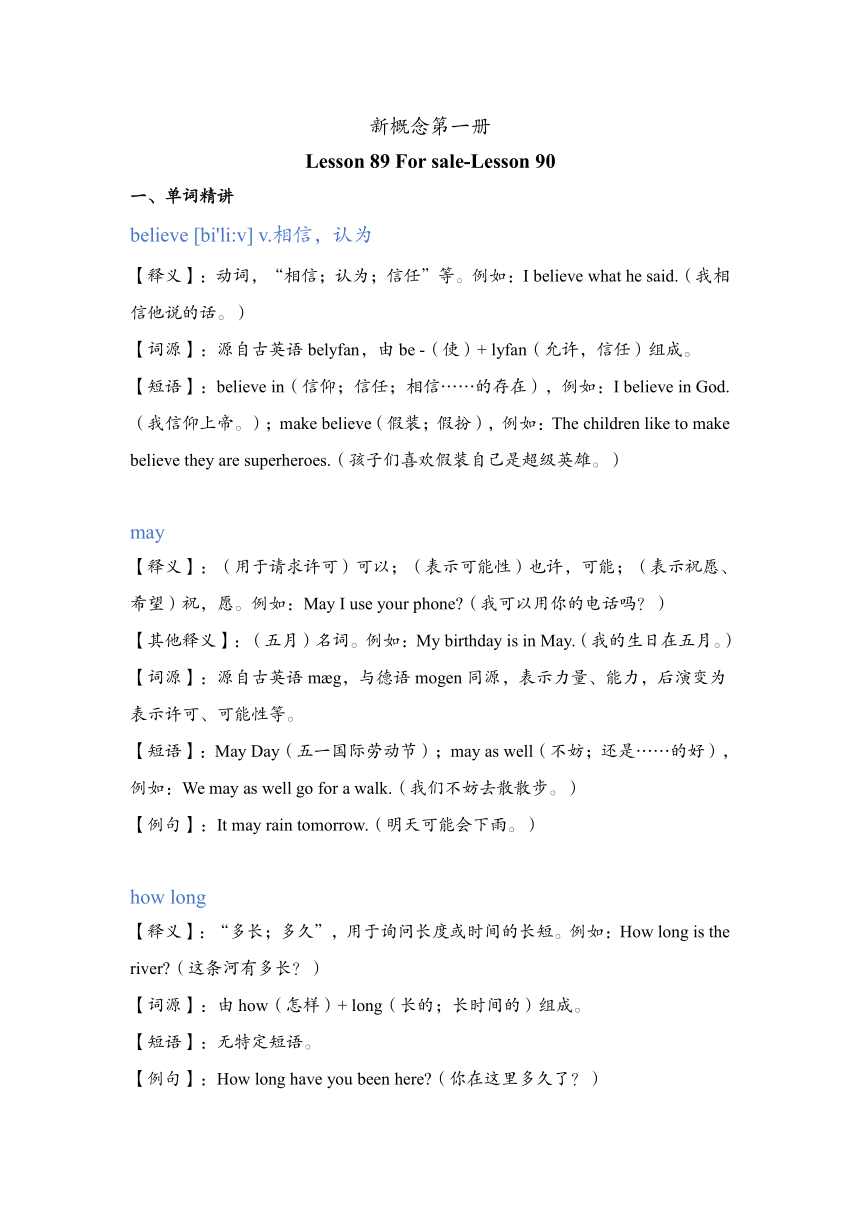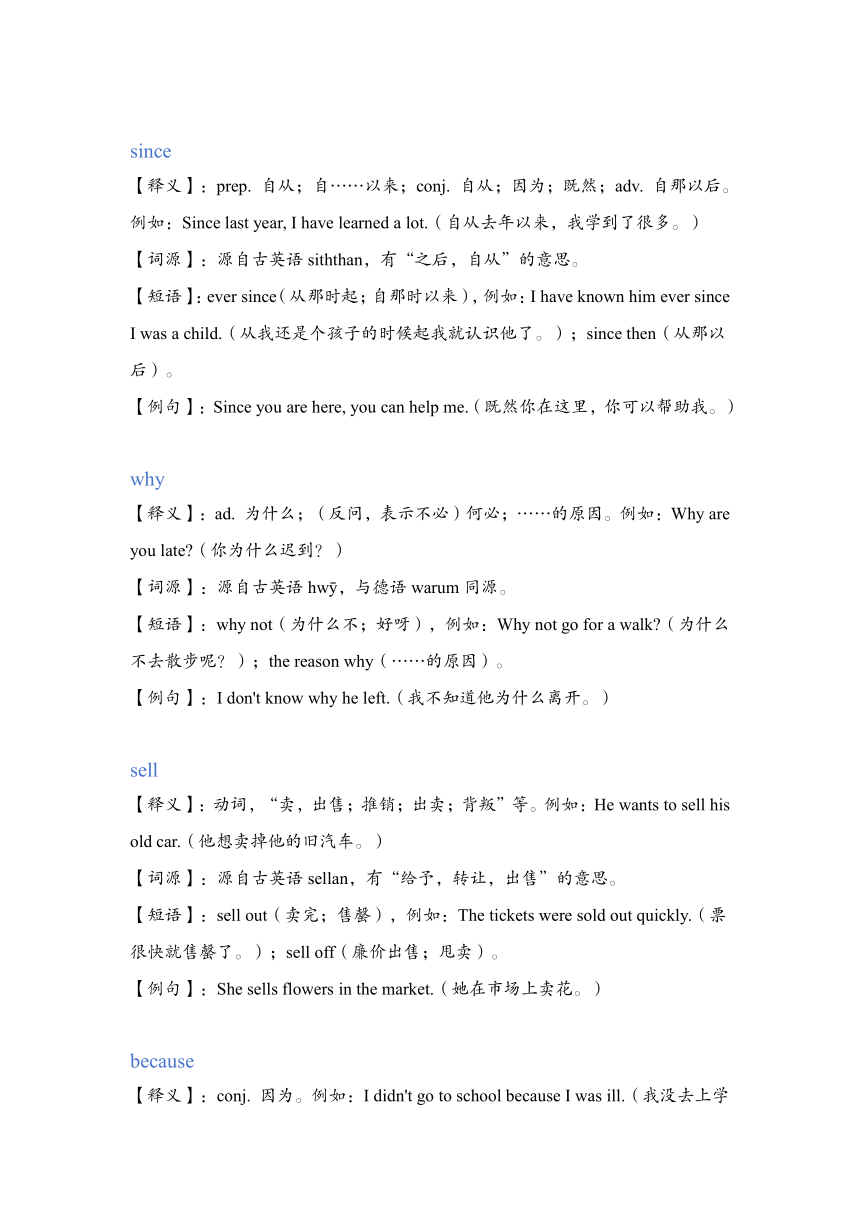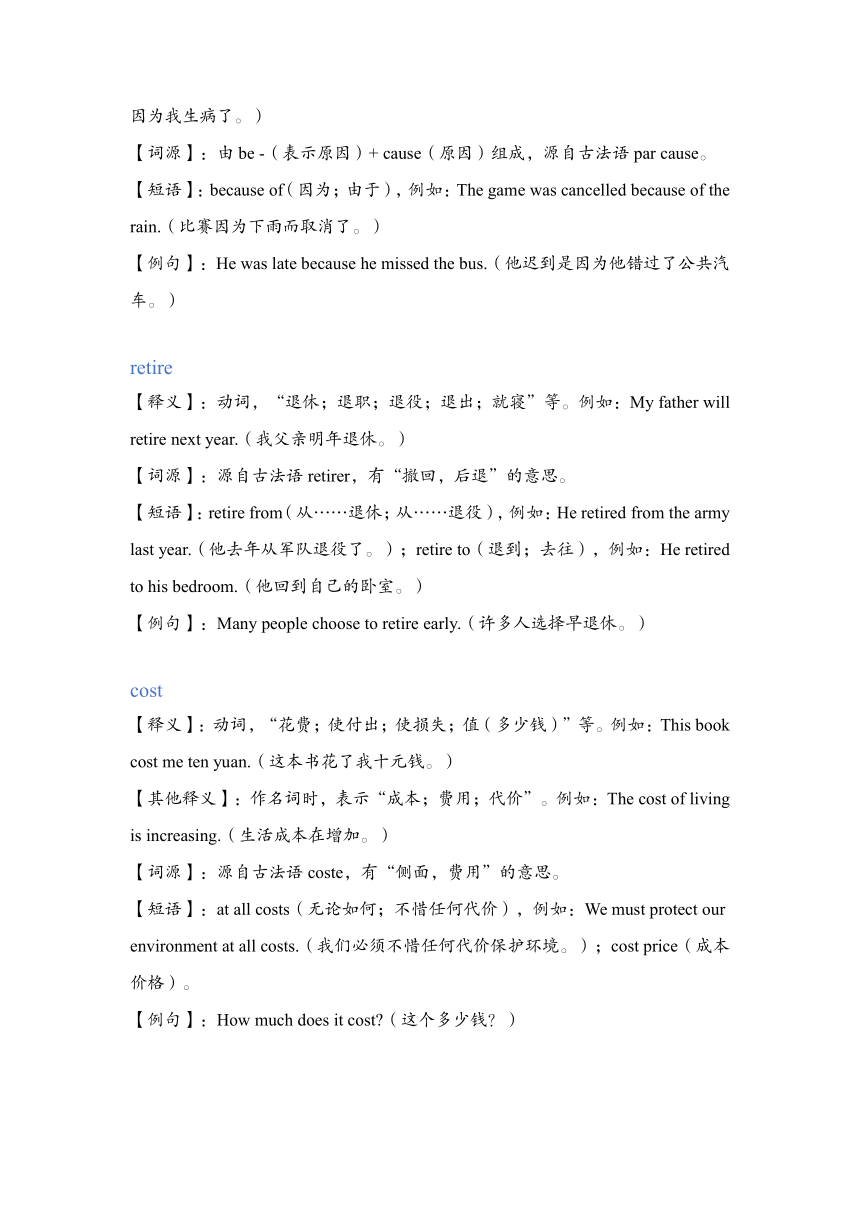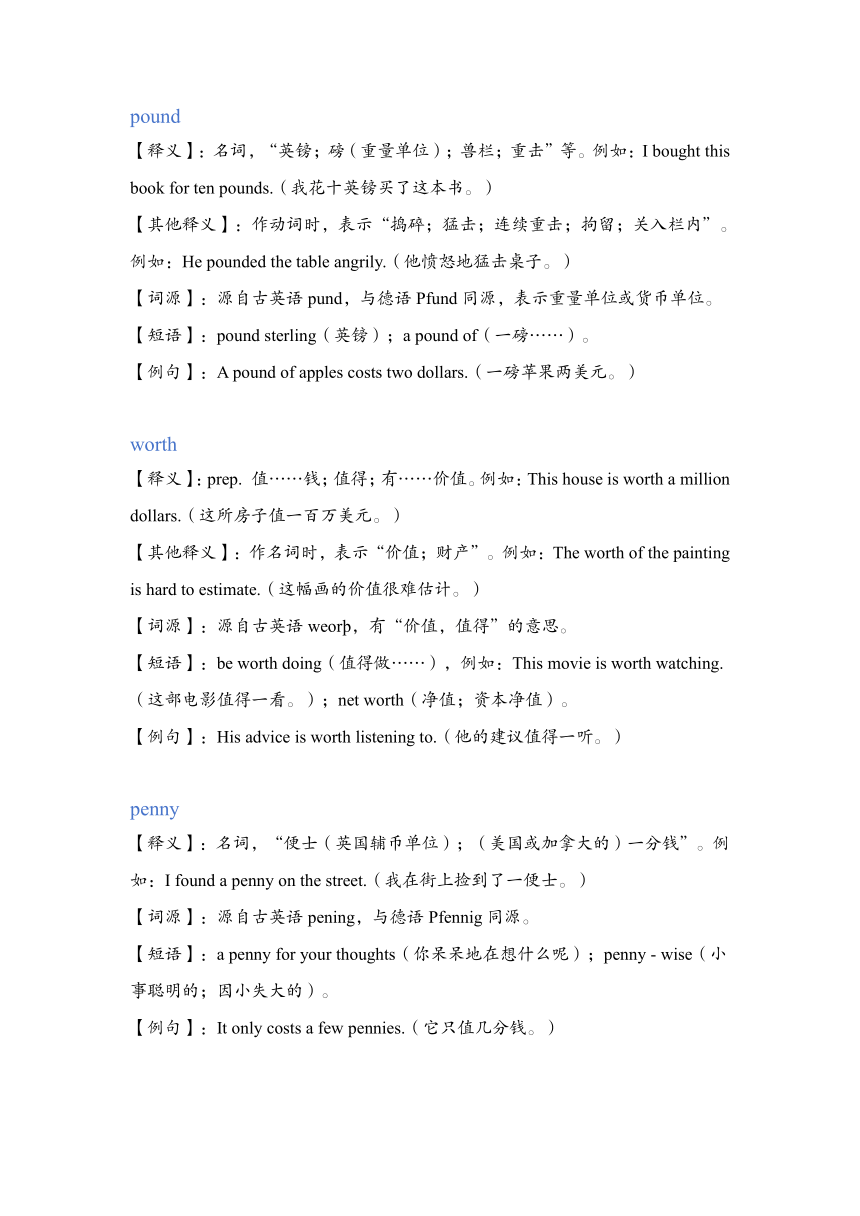新概念第一册Lesson 89 For sale-Lesson 90讲义
文档属性
| 名称 | 新概念第一册Lesson 89 For sale-Lesson 90讲义 |

|
|
| 格式 | docx | ||
| 文件大小 | 138.8KB | ||
| 资源类型 | 教案 | ||
| 版本资源 | 新概念英语 | ||
| 科目 | 英语 | ||
| 更新时间 | 2024-12-03 00:00:00 | ||
图片预览




文档简介
新概念第一册
Lesson 89 For sale-Lesson 90
单词精讲
believe [bi'li:v] v.相信,认为
【释义】:动词,“相信;认为;信任”等。例如:I believe what he said.(我相信他说的话。)
【词源】:源自古英语belyfan,由be -(使)+ lyfan(允许,信任)组成。
【短语】:believe in(信仰;信任;相信……的存在),例如:I believe in God.(我信仰上帝。);make believe(假装;假扮),例如:The children like to make believe they are superheroes.(孩子们喜欢假装自己是超级英雄。)
may
【释义】:(用于请求许可)可以;(表示可能性)也许,可能;(表示祝愿、希望)祝,愿。例如:May I use your phone (我可以用你的电话吗?)
【其他释义】:(五月)名词。例如:My birthday is in May.(我的生日在五月。)
【词源】:源自古英语m g,与德语mogen同源,表示力量、能力,后演变为表示许可、可能性等。
【短语】:May Day(五一国际劳动节);may as well(不妨;还是……的好),例如:We may as well go for a walk.(我们不妨去散散步。)
【例句】:It may rain tomorrow.(明天可能会下雨。)
how long
【释义】:“多长;多久”,用于询问长度或时间的长短。例如:How long is the river (这条河有多长?)
【词源】:由how(怎样)+ long(长的;长时间的)组成。
【短语】:无特定短语。
【例句】:How long have you been here (你在这里多久了?)
since
【释义】:prep. 自从;自……以来;conj. 自从;因为;既然;adv. 自那以后。例如:Since last year, I have learned a lot.(自从去年以来,我学到了很多。)
【词源】:源自古英语siththan,有“之后,自从”的意思。
【短语】:ever since(从那时起;自那时以来),例如:I have known him ever since I was a child.(从我还是个孩子的时候起我就认识他了。);since then(从那以后)。
【例句】:Since you are here, you can help me.(既然你在这里,你可以帮助我。)
why
【释义】:ad. 为什么;(反问,表示不必)何必;……的原因。例如:Why are you late (你为什么迟到?)
【词源】:源自古英语hw ,与德语warum同源。
【短语】:why not(为什么不;好呀),例如:Why not go for a walk (为什么不去散步呢?);the reason why(……的原因)。
【例句】:I don't know why he left.(我不知道他为什么离开。)
sell
【释义】:动词,“卖,出售;推销;出卖;背叛”等。例如:He wants to sell his old car.(他想卖掉他的旧汽车。)
【词源】:源自古英语sellan,有“给予,转让,出售”的意思。
【短语】:sell out(卖完;售罄),例如:The tickets were sold out quickly.(票很快就售罄了。);sell off(廉价出售;甩卖)。
【例句】:She sells flowers in the market.(她在市场上卖花。)
because
【释义】:conj. 因为。例如:I didn't go to school because I was ill.(我没去上学因为我生病了。)
【词源】:由be -(表示原因)+ cause(原因)组成,源自古法语par cause。
【短语】:because of(因为;由于),例如:The game was cancelled because of the rain.(比赛因为下雨而取消了。)
【例句】:He was late because he missed the bus.(他迟到是因为他错过了公共汽车。)
retire
【释义】:动词,“退休;退职;退役;退出;就寝”等。例如:My father will retire next year.(我父亲明年退休。)
【词源】:源自古法语retirer,有“撤回,后退”的意思。
【短语】:retire from(从……退休;从……退役),例如:He retired from the army last year.(他去年从军队退役了。);retire to(退到;去往),例如:He retired to his bedroom.(他回到自己的卧室。)
【例句】:Many people choose to retire early.(许多人选择早退休。)
cost
【释义】:动词,“花费;使付出;使损失;值(多少钱)”等。例如:This book cost me ten yuan.(这本书花了我十元钱。)
【其他释义】:作名词时,表示“成本;费用;代价”。例如:The cost of living is increasing.(生活成本在增加。)
【词源】:源自古法语coste,有“侧面,费用”的意思。
【短语】:at all costs(无论如何;不惜任何代价),例如:We must protect our environment at all costs.(我们必须不惜任何代价保护环境。);cost price(成本价格)。
【例句】:How much does it cost (这个多少钱?)
pound
【释义】:名词,“英镑;磅(重量单位);兽栏;重击”等。例如:I bought this book for ten pounds.(我花十英镑买了这本书。)
【其他释义】:作动词时,表示“捣碎;猛击;连续重击;拘留;关入栏内”。例如:He pounded the table angrily.(他愤怒地猛击桌子。)
【词源】:源自古英语pund,与德语Pfund同源,表示重量单位或货币单位。
【短语】:pound sterling(英镑);a pound of(一磅……)。
【例句】:A pound of apples costs two dollars.(一磅苹果两美元。)
worth
【释义】:prep. 值……钱;值得;有……价值。例如:This house is worth a million dollars.(这所房子值一百万美元。)
【其他释义】:作名词时,表示“价值;财产”。例如:The worth of the painting is hard to estimate.(这幅画的价值很难估计。)
【词源】:源自古英语weor ,有“价值,值得”的意思。
【短语】:be worth doing(值得做……),例如:This movie is worth watching.(这部电影值得一看。);net worth(净值;资本净值)。
【例句】:His advice is worth listening to.(他的建议值得一听。)
penny
【释义】:名词,“便士(英国辅币单位);(美国或加拿大的)一分钱”。例如:I found a penny on the street.(我在街上捡到了一便士。)
【词源】:源自古英语pening,与德语Pfennig同源。
【短语】:a penny for your thoughts(你呆呆地在想什么呢);penny - wise(小事聪明的;因小失大的)。
【例句】:It only costs a few pennies.(它只值几分钱。)
词法
1.现在完成时的“未完成”用法通常与表示一段时间的状语连用:
(1)由 since 引导的时间状语:
since 用做介词,后跟表时间的短语时,必须是确定的“时间点”,而不能是“一段时间”。
since last year 自去年
since 1949 自1949年
(2)由 for 引导的时间状语:
for 后跟的是表示“一段时间”的短语,不能跟“时间点”。
for a year 一年时间
2.表示“售卖”的词性辨析:
(1)动词:sell
(2)名词:sale
for sale:待售;on sale:出售某商品,某物品上市
3.动词cost
(1)表示“价格为……,需花费 ……”
This new book costs 100 yuan.这本新书的定价是100元。
The meal cost us 20 dollars.这顿饭花了我们20美金。
(2)表示“使付出代价,使丧失……”
Crazy driving may cost your life.开车过快可能会带给你生命危险。
4.形容词worth,表示“值得的”一般在句子里作表语
What do you think of the film 你怎么看待这部电影?
It's worth every minute of it.为这部电影所花费的每一分钟都是值得的。
重点句型
for与 since
现在完成时还可以描述发生在过去且一直延续到现在的动作,这种动作甚至有可能延续下去。在这种情况下,它一般与for+ 一段时间、since+ 某个时间点连用。
请注意:for+ 一段时间表示某个动作持续多长时间;since+ 某个时间点表示某个动作是何时开始的。
现在完成时总复习
1) 表示含义
在过去一个不确定的时间里发生,并与现在有着某种联系的动作
开始于过去并持续到现在的动作
表示刚刚完成的动作
表示最近发生的动作
2) 构成
肯定句:主语+has/have+过去分词
I have already had my breakfast.
否定句:主语+hasn't/haven't+过去分词
I have not had my breakfast yet.
疑问句:把 has/have 提前
Have you had your breakfast yet
特殊疑问句:
What have you done
How long have you lived here
四、课文精讲
1. I believe that this house is for sale.
【译文】我想这房子是在准备出售吧!
【用法】(1)believe vt.相信,信任
believe sb.that+宾语从句
believe vi.信仰,相信(某人/某事物)的存在
believe in sb./sth.
Do you believe in ghosts 你相信有鬼吗
Believe it or not.信不信由你。
belief n.信任,信仰,信赖
(2)宾语从句
定义:由句子来充当宾语的成分。
结构:宾语从句需要由引导词引出。当引导词是that时,由于that在句中既不充当成分又没实际含义,所以可以省略。但其他引导词在宾语从句中要充当成分,所以不能省略。
通常可以跟宾语从句的动词有:say/think/believe/know/understand/be afraid /besorry /be sure(that)。句子分析:
I believe that this house is for sale.
主语I,谓语believe,引导词that,宾语从句this house is for sale。
之所以说是从句是因为在宾语部分又出现了谓语动词,使它构成了句子。
(3)sale n.销售,出售,销售量(额)
for sale待售(由物主或代理人经手)
on sale 出售,上市
sell v.卖,出售sell-sold-sold(tell-told-told)
sell out售完,卖光
sell sb.out出卖某人,背叛某人
2. How long have you lived here I've lived here for twenty years.
【译文】您在这里住了多久了?我已经在这里住了二十多年了。
【用法】(1)how long特殊疑问代词,可对时间的长短和距离的远近提间。
How long have you been together 你们在一起多久了
How long is the Great Wall 长城有多长
(2)for twenty years:
for .prep.
①for sb.为了某人,给予某人
This present is for you.这份礼物是给你的。
②for a time表跨度了多长的时间
3. That's a long time.
【译文】时间不短啊。
【用法】 time n.
(1)(U)时间,一段时间Time and tide wait for no man.
(2)(C)(以年、月、小时等单位计量的)时间,可计算的一段确切的时间
Twenty years is a long time.
(3)(C)次数(一次、两次……)I have been there for three times.
(4)时代,时期in Victoria's Times
times .prep.乘以Three times four is twelve.
4. I have been here since 1976.
【译文】我从1976年起就住这里了。
【用法】since prep.自从
He has lived here since 1976.
It has been ten years since we met last time.
They have made many friends since they came here.
(1)since后可直接跟时间状语。
(2)主句用现在完成时,since后跟句子要用一般过去时。
5. How much does this house cost
【译文】这座房子卖多少钱?
【用法】 cost v.
(1)(通常不用于进行时态)价钱为,需花费
The meal cost us$ 20.这顿饭花了我们20美金。
(2)使付出(代价),使丧失
Crazy driving may cost you your life.疯狂驾车有生命危险。
n.价格,费用,损失,牺牲:
at all costs不管任何代价
at the cost of以……为代价
6.It's worth every penny of it!
【译文】一分价钱一分货。
【用法】 worth adj.(作表语)有某种价值
What do you think of the film
It's worth every minute of it.
7. Women always has the last word.
【译文】女人们总是最后说了算的。
【用法】have the last word=have a say 最后拍板
Lesson 89 For sale-Lesson 90
单词精讲
believe [bi'li:v] v.相信,认为
【释义】:动词,“相信;认为;信任”等。例如:I believe what he said.(我相信他说的话。)
【词源】:源自古英语belyfan,由be -(使)+ lyfan(允许,信任)组成。
【短语】:believe in(信仰;信任;相信……的存在),例如:I believe in God.(我信仰上帝。);make believe(假装;假扮),例如:The children like to make believe they are superheroes.(孩子们喜欢假装自己是超级英雄。)
may
【释义】:(用于请求许可)可以;(表示可能性)也许,可能;(表示祝愿、希望)祝,愿。例如:May I use your phone (我可以用你的电话吗?)
【其他释义】:(五月)名词。例如:My birthday is in May.(我的生日在五月。)
【词源】:源自古英语m g,与德语mogen同源,表示力量、能力,后演变为表示许可、可能性等。
【短语】:May Day(五一国际劳动节);may as well(不妨;还是……的好),例如:We may as well go for a walk.(我们不妨去散散步。)
【例句】:It may rain tomorrow.(明天可能会下雨。)
how long
【释义】:“多长;多久”,用于询问长度或时间的长短。例如:How long is the river (这条河有多长?)
【词源】:由how(怎样)+ long(长的;长时间的)组成。
【短语】:无特定短语。
【例句】:How long have you been here (你在这里多久了?)
since
【释义】:prep. 自从;自……以来;conj. 自从;因为;既然;adv. 自那以后。例如:Since last year, I have learned a lot.(自从去年以来,我学到了很多。)
【词源】:源自古英语siththan,有“之后,自从”的意思。
【短语】:ever since(从那时起;自那时以来),例如:I have known him ever since I was a child.(从我还是个孩子的时候起我就认识他了。);since then(从那以后)。
【例句】:Since you are here, you can help me.(既然你在这里,你可以帮助我。)
why
【释义】:ad. 为什么;(反问,表示不必)何必;……的原因。例如:Why are you late (你为什么迟到?)
【词源】:源自古英语hw ,与德语warum同源。
【短语】:why not(为什么不;好呀),例如:Why not go for a walk (为什么不去散步呢?);the reason why(……的原因)。
【例句】:I don't know why he left.(我不知道他为什么离开。)
sell
【释义】:动词,“卖,出售;推销;出卖;背叛”等。例如:He wants to sell his old car.(他想卖掉他的旧汽车。)
【词源】:源自古英语sellan,有“给予,转让,出售”的意思。
【短语】:sell out(卖完;售罄),例如:The tickets were sold out quickly.(票很快就售罄了。);sell off(廉价出售;甩卖)。
【例句】:She sells flowers in the market.(她在市场上卖花。)
because
【释义】:conj. 因为。例如:I didn't go to school because I was ill.(我没去上学因为我生病了。)
【词源】:由be -(表示原因)+ cause(原因)组成,源自古法语par cause。
【短语】:because of(因为;由于),例如:The game was cancelled because of the rain.(比赛因为下雨而取消了。)
【例句】:He was late because he missed the bus.(他迟到是因为他错过了公共汽车。)
retire
【释义】:动词,“退休;退职;退役;退出;就寝”等。例如:My father will retire next year.(我父亲明年退休。)
【词源】:源自古法语retirer,有“撤回,后退”的意思。
【短语】:retire from(从……退休;从……退役),例如:He retired from the army last year.(他去年从军队退役了。);retire to(退到;去往),例如:He retired to his bedroom.(他回到自己的卧室。)
【例句】:Many people choose to retire early.(许多人选择早退休。)
cost
【释义】:动词,“花费;使付出;使损失;值(多少钱)”等。例如:This book cost me ten yuan.(这本书花了我十元钱。)
【其他释义】:作名词时,表示“成本;费用;代价”。例如:The cost of living is increasing.(生活成本在增加。)
【词源】:源自古法语coste,有“侧面,费用”的意思。
【短语】:at all costs(无论如何;不惜任何代价),例如:We must protect our environment at all costs.(我们必须不惜任何代价保护环境。);cost price(成本价格)。
【例句】:How much does it cost (这个多少钱?)
pound
【释义】:名词,“英镑;磅(重量单位);兽栏;重击”等。例如:I bought this book for ten pounds.(我花十英镑买了这本书。)
【其他释义】:作动词时,表示“捣碎;猛击;连续重击;拘留;关入栏内”。例如:He pounded the table angrily.(他愤怒地猛击桌子。)
【词源】:源自古英语pund,与德语Pfund同源,表示重量单位或货币单位。
【短语】:pound sterling(英镑);a pound of(一磅……)。
【例句】:A pound of apples costs two dollars.(一磅苹果两美元。)
worth
【释义】:prep. 值……钱;值得;有……价值。例如:This house is worth a million dollars.(这所房子值一百万美元。)
【其他释义】:作名词时,表示“价值;财产”。例如:The worth of the painting is hard to estimate.(这幅画的价值很难估计。)
【词源】:源自古英语weor ,有“价值,值得”的意思。
【短语】:be worth doing(值得做……),例如:This movie is worth watching.(这部电影值得一看。);net worth(净值;资本净值)。
【例句】:His advice is worth listening to.(他的建议值得一听。)
penny
【释义】:名词,“便士(英国辅币单位);(美国或加拿大的)一分钱”。例如:I found a penny on the street.(我在街上捡到了一便士。)
【词源】:源自古英语pening,与德语Pfennig同源。
【短语】:a penny for your thoughts(你呆呆地在想什么呢);penny - wise(小事聪明的;因小失大的)。
【例句】:It only costs a few pennies.(它只值几分钱。)
词法
1.现在完成时的“未完成”用法通常与表示一段时间的状语连用:
(1)由 since 引导的时间状语:
since 用做介词,后跟表时间的短语时,必须是确定的“时间点”,而不能是“一段时间”。
since last year 自去年
since 1949 自1949年
(2)由 for 引导的时间状语:
for 后跟的是表示“一段时间”的短语,不能跟“时间点”。
for a year 一年时间
2.表示“售卖”的词性辨析:
(1)动词:sell
(2)名词:sale
for sale:待售;on sale:出售某商品,某物品上市
3.动词cost
(1)表示“价格为……,需花费 ……”
This new book costs 100 yuan.这本新书的定价是100元。
The meal cost us 20 dollars.这顿饭花了我们20美金。
(2)表示“使付出代价,使丧失……”
Crazy driving may cost your life.开车过快可能会带给你生命危险。
4.形容词worth,表示“值得的”一般在句子里作表语
What do you think of the film 你怎么看待这部电影?
It's worth every minute of it.为这部电影所花费的每一分钟都是值得的。
重点句型
for与 since
现在完成时还可以描述发生在过去且一直延续到现在的动作,这种动作甚至有可能延续下去。在这种情况下,它一般与for+ 一段时间、since+ 某个时间点连用。
请注意:for+ 一段时间表示某个动作持续多长时间;since+ 某个时间点表示某个动作是何时开始的。
现在完成时总复习
1) 表示含义
在过去一个不确定的时间里发生,并与现在有着某种联系的动作
开始于过去并持续到现在的动作
表示刚刚完成的动作
表示最近发生的动作
2) 构成
肯定句:主语+has/have+过去分词
I have already had my breakfast.
否定句:主语+hasn't/haven't+过去分词
I have not had my breakfast yet.
疑问句:把 has/have 提前
Have you had your breakfast yet
特殊疑问句:
What have you done
How long have you lived here
四、课文精讲
1. I believe that this house is for sale.
【译文】我想这房子是在准备出售吧!
【用法】(1)believe vt.相信,信任
believe sb.that+宾语从句
believe vi.信仰,相信(某人/某事物)的存在
believe in sb./sth.
Do you believe in ghosts 你相信有鬼吗
Believe it or not.信不信由你。
belief n.信任,信仰,信赖
(2)宾语从句
定义:由句子来充当宾语的成分。
结构:宾语从句需要由引导词引出。当引导词是that时,由于that在句中既不充当成分又没实际含义,所以可以省略。但其他引导词在宾语从句中要充当成分,所以不能省略。
通常可以跟宾语从句的动词有:say/think/believe/know/understand/be afraid /besorry /be sure(that)。句子分析:
I believe that this house is for sale.
主语I,谓语believe,引导词that,宾语从句this house is for sale。
之所以说是从句是因为在宾语部分又出现了谓语动词,使它构成了句子。
(3)sale n.销售,出售,销售量(额)
for sale待售(由物主或代理人经手)
on sale 出售,上市
sell v.卖,出售sell-sold-sold(tell-told-told)
sell out售完,卖光
sell sb.out出卖某人,背叛某人
2. How long have you lived here I've lived here for twenty years.
【译文】您在这里住了多久了?我已经在这里住了二十多年了。
【用法】(1)how long特殊疑问代词,可对时间的长短和距离的远近提间。
How long have you been together 你们在一起多久了
How long is the Great Wall 长城有多长
(2)for twenty years:
for .prep.
①for sb.为了某人,给予某人
This present is for you.这份礼物是给你的。
②for a time表跨度了多长的时间
3. That's a long time.
【译文】时间不短啊。
【用法】 time n.
(1)(U)时间,一段时间Time and tide wait for no man.
(2)(C)(以年、月、小时等单位计量的)时间,可计算的一段确切的时间
Twenty years is a long time.
(3)(C)次数(一次、两次……)I have been there for three times.
(4)时代,时期in Victoria's Times
times .prep.乘以Three times four is twelve.
4. I have been here since 1976.
【译文】我从1976年起就住这里了。
【用法】since prep.自从
He has lived here since 1976.
It has been ten years since we met last time.
They have made many friends since they came here.
(1)since后可直接跟时间状语。
(2)主句用现在完成时,since后跟句子要用一般过去时。
5. How much does this house cost
【译文】这座房子卖多少钱?
【用法】 cost v.
(1)(通常不用于进行时态)价钱为,需花费
The meal cost us$ 20.这顿饭花了我们20美金。
(2)使付出(代价),使丧失
Crazy driving may cost you your life.疯狂驾车有生命危险。
n.价格,费用,损失,牺牲:
at all costs不管任何代价
at the cost of以……为代价
6.It's worth every penny of it!
【译文】一分价钱一分货。
【用法】 worth adj.(作表语)有某种价值
What do you think of the film
It's worth every minute of it.
7. Women always has the last word.
【译文】女人们总是最后说了算的。
【用法】have the last word=have a say 最后拍板
同课章节目录
